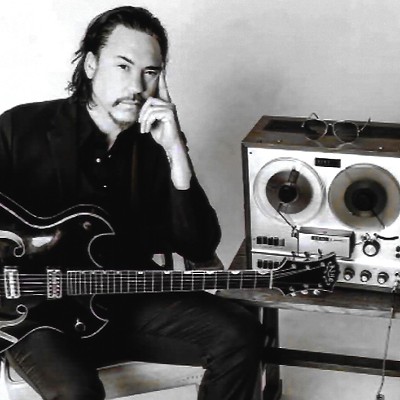It’s an enviable position for any musician to find him or herself in: You have enough disposable income to need something to spend it on. But instead of drugs, flashy cars or shady offshore investment situations, in the early 1970s Scottish singer/songwriter Al Stewart decided he’d literally put his money where his mouth was—and learn everything he could about wine.
“I’m somewhat good at it!” Stewart—who wrote and played an entire concept album about wine in 2001 with Down in the Cellar—says. And it all started when he picked up a copy of the evergreen Bible of the Fermented Grape The World Atlas of Wine by Hugh Johnson.
“Being European, I grew up on Bordeaux, and the book had all these labels in it from the seven different regions. I would open a bottle, steam the label off, and put it in a book and write my comments underneath it,” he continues. “After I had 100 bottles of red Bordeaux, it all swam into focus!”
Stewart then gives a lengthy dissertation about vinology including weather conditions for growing, his own ability to nail a specific year’s vintage by taste, and how the prices have grown to today’s “eye watering” levels for rare or particularly good vintages, which he says often end up mostly as “status symbols for billionaires.”
Stewart is known as such an expert on the grape that he led a wine tasting earlier this month for the classic/soft rock-themed On the Blue Cruise. He was part of a lineup that included a bevy of like-minded acts including Justin Hayward of the Moody Blues, the Zombies, Alan Parsons, Dave Mason, Little River Band, Ambrosia and Firefall. And while he may not have the facial recognition to the general public that would cause him to get mobbed while strolling around the boat, he says it’s all OK.
“We walk around all the time. I mean, it’s not like we’re a boy band and people are screaming at you. The average age on these cruises is around 60!” he laughs. “They’re basically pleasant and polite and tell me how much they liked the show. Although you do have to be a bit of a politician getting asked the same questions. To be honest, that tends to happen most in elevators!”
Stewart is also an avid reader, especially of history. The study often finds its way into his songs like “Lord Grenville” about the UK naval commander who died during an ill-advised and ultimately devastating naval attack against a Spanish Fleet in 1591. And “Roads to Moscow” about Hitler’s double-crossing of Stalin during World War II. He estimates that he tore through “about 100 books” during his pandemic-forced layoff from the road, and with his wife also did a lot of jigsaw puzzles, which he hadn’t really attempted since his youth.
Al Stewart started his career in the ‘60s as a UK singer/songwriter very much in the folk vein and was a contemporary of acts like Fairport Convention, Steeleye Span and Richard Thompson. But he added a bit of an electrical tinge in lengthy narrative songs like “Bedsitter Images,” “In Brooklyn,” “Carol” and “Electric Los Angeles Sunset.” He also crossed over into broader pop success with “On the Border,” “Song on the Radio” and “Time Passages.”
But he’s best known for the fantastical feline-inspired “Year of the Cat.” As he explained to Wall Street Journal music journalist Marc Myers last year for the “Anatomy of a Song” column, the tune has a long and years-long winding path. Stewart originally wrote the melody for “Foot of the Stage,” a tribute to British comedian Tony Hancock who committed suicide by overdosing on pills in 1968 at the age of 44. After being told most Americans wouldn’t relate to the subject, it morphed into “Year of the Horse”—though its subject the still Anglophilic tale of the real-life Princess Anne and her show horse.
By 1975, he was dating a woman who was into astrology, and one day she had left open a book on the Vietnamese Zodiac: 1975 was the “Year of the Cat.” He reworked the lyrics to relay an abstract fantasy of a romantic trip to Morocco for two lovers who just go with the flow on whatever situation they happen to find themselves in. He added some Dylanesque word phrases and a reference to the movie Casablanca over sounds that included jazz, folk, and electric rock.
The distinctive piano intro and motif was created by Peter Wood as a concert warmup exercise Stewart happen to overhear. Stewart loved and Wood received a co-writing credit, with Alan Parsons producing the track.
By the time “Year of the Cat” came out (it was also the name of the album), Stewart and his girlfriend had broken up, and he doesn’t know if she ever realized how she kickstarted the title. It eventually rose to No. 8 on the Billboard singles chart in 1976 and has become Stewart’s signature tune. Last year, a deluxe and expanded 45th anniversary box set of the album as released.
“In doing this for so many years, I know that, for better or worse, a lot of [musicians] end up with a ‘signature tune’. For Steve Forbert, it was ‘Romeo’s Tune’ and for Loudon Wainwright III it was ‘Dead Skunk!’” he says. “I suppose if you throw enough stuff against the wall, something will stick. But the ‘signature songs’ aren’t necessarily the best ones.”
Playing with Al Stewart on this tour and doing a short opening set will be the Empty Pockets. Stewart first saw the Chicago-based rock/folk/blues quartet when they were the backup band for his onetime co-headlining tour mate Gary Wright (“Dream Weaver,” “Love is Alive”). They came up one night and guested on “Year of the Cat” with Stewart, and when their time with Wright had ended, Stewart scooped them up.
“You could say I inherited them about six or seven years ago!” he laughs. “It’s been hundreds of shows now, and they know a lot of my songs. It adds a lot to what I was doing, which was mostly solo acoustic things.”
Finally, Stewart then enthuses about his earliest songwriting heroes from the dawn of rock and roll including Chuck Berry and Eddie Cochran.
“I mean, ‘I was motorvatin’ over the hill’ from Chuck Berry’s ‘Maybellene.’ It’s not smarmy ballads like ‘You broke my heart and tore it apart!'” he says. “Chuck was such a breath of fresh air. So were [songwriters] Jerry Leiber and Mike Stoller. I mean, ‘Love Potion No. 9!’ Then you had Dylan, Joni Mitchell, Paul Simon and Leonard Cohen changing everything again! Plus, Ray Davies, John Lennon and Pete Townshend.”
Stewart also professes a disdain for “All the Bobbys” in music during the early ‘60s. That would be the safe, often Italian-bred crooners with last names (real or invented) like Rydell, Vinton, Vee, Rydell and Goldsboro. The last had a hit with the particularly treacly “Honey” about the death of the narrator’s girlfriend.
“They were always dying, weren’t they?” Stewart laughs. “So morbid. But I did like [Jody Reynolds’] ‘Endless Sleep.’”
Al Stewart and the Empty Pockets play 7:30 p.m. on Sunday, March 5, at the Dosey Doe Big Barn, 25911 I-45. For information, call 281-367-3774 or visit DoseyDoeTickets.com. $98-$158 and includes a three-course meal and soft drink.
For more on Al Stewart, visit AlStewart.com
Support Us
Houston's independent source of
local news and culture
account
- Welcome,
Insider - Login
- My Account
- My Newsletters
- Contribute
- Contact Us
- Sign out
Al Stewart: Of Zodiac Cats, Succulent Grapes and the Genius of Chuck Berry
Bob Ruggiero February 16, 2023 4:00AM

Al Stewart at a recent concert.
Photo by David W. Clement
[
{
"name": "Related Stories / Support Us Combo",
"component": "11591218",
"insertPoint": "4",
"requiredCountToDisplay": "4"
},{
"name": "Air - Billboard - Inline Content",
"component": "11591214",
"insertPoint": "2/3",
"requiredCountToDisplay": "7"
},{
"name": "R1 - Beta - Mobile Only",
"component": "12287027",
"insertPoint": "8",
"requiredCountToDisplay": "8"
},{
"name": "Air - MediumRectangle - Inline Content - Mobile Display Size 2",
"component": "11591215",
"insertPoint": "12",
"requiredCountToDisplay": "12"
},{
"name": "Air - MediumRectangle - Inline Content - Mobile Display Size 2",
"component": "11591215",
"insertPoint": "4th",
"startingPoint": "16",
"requiredCountToDisplay": "12"
}
]
KEEP THE HOUSTON PRESS FREE...
Since we started the Houston Press, it has been defined as the free, independent voice of Houston, and we'd like to keep it that way. With local media under siege, it's more important than ever for us to rally support behind funding our local journalism. You can help by participating in our "I Support" program, allowing us to keep offering readers access to our incisive coverage of local news, food and culture with no paywalls.
Bob Ruggiero has been writing about music, books, visual arts and entertainment for the Houston Press since 1997, with an emphasis on classic rock. He used to have an incredible and luxurious mullet in college as well. He is the author of the band biography Slippin’ Out of Darkness: The Story of WAR.
Contact:
Bob Ruggiero
Trending Music
- Country Rock Thrives with Gene Clark and Flying Burrito Brothers for Record Store Day
- Bruce Robison Is The Eternal Song Hunter
- Top 10 Butt-Rock Bands of All Time
-
Sponsored Content From: [%sponsoredBy%]
[%title%]

Don't Miss Out
SIGN UP for the latest
Music
news, free stuff and more!
Become a member to support the independent voice of Houston
and help keep the future of the Houston Press FREE
Use of this website constitutes acceptance of our
terms of use,
our cookies policy, and our
privacy policy
The Houston Press may earn a portion of sales from products & services purchased through links on our site from our
affiliate partners.
©2024
Houston Press, LP. All rights reserved.






